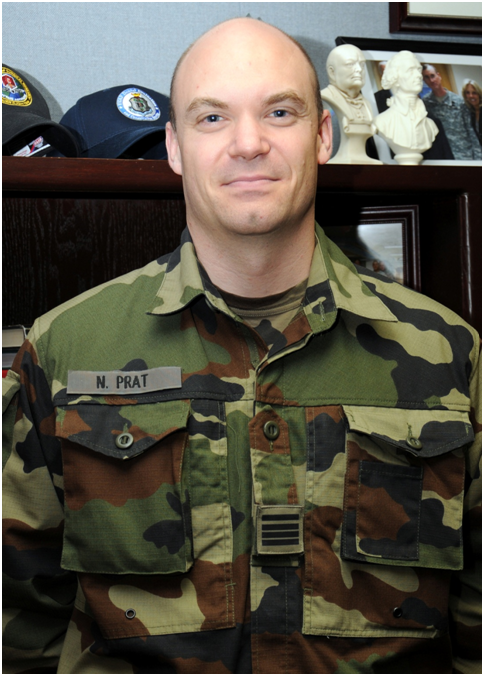First French Army Soldier Working at the ISR
International collaboration on research projects is common at the U.S. Army Institute of Surgical Research at Fort Sam Houston, Texas. With 22 international employees from 13 countries from around the world at the ISR, collaborative studies are beneficial for combat wounded. In January, the ISR gained its newest International staff member from the French Army. Maj. (Dr.) Nicolas Prat is the first French Soldier to work at the ISR through an international exchange program between the U.S. and French governments.
"This type of exchange program is beneficial to both countries," said Prat. "Especially for the French because I can take what I learn here and apply to my new job when I return to France."
After two years of his current assignment at the ISR, Prat will return to Paris to command a new laboratory currently under construction. The facility is the Institut de Recherche Biomédicale des Armées. (French Armed Forces Blood Transfusion Center).
"I am very glad to be working with the U.S. Army," he said. "It is very cool for me to be abroad and to be working the U.S. It is very beneficial for me to see and learn how the U.S. Army labs are organized, and I will be able to use this in the new lab when I return."
The exchange program was possible through one of ISR's staff members being at the right place at the right time. While attending a meeting on freeze-dried plasma co-hosted by the National Institutes of Health (NIH) in 2009, Lt. Col. (Dr.) Andrew P. Cap, Task Area Manager for Coagulation and Blood, sat at the back of the conference hall while a French colonel presented his army's freeze-dried plasma product.
"He didn't speak English very well," said Cap. "He was able to get through the presentation, but when it came to the Q and A session, he was struggling. "So I was way in the back and for whatever reason, the translator who was supposed to translate for him didn't. While trying to answer a question in English, the presenter said, 'I need some help' in French. So I made my way up to the front and sat down next to him and translated for him. The Q and A session last about 45 minutes. People were really interested in the French product."
Fluent in French, Cap had befriended the French officers attending the meeting while having dinner the night before the presentation.
For several months after the NIH meeting, Cap maintained contact with the French and learned about the exchange program between the two countries.
"So it was good to be there," Cap said. "Basically, from that point on, we worked on making this exchange program work. We identified Nicolas as a candidate for coming to the U.S. during another conference in 2010."
Prat who has been in the French army since 1996 is a physician and physiologist and will be working at the ISR's Combat Casualty Care Research Directorate on a study of coagulation changes in blast injuries, among other studies.
"This type of international collaboration is beneficial to both countries," said Cap. "France is a NATO ally; and the more we work together, the more we establish links between the two militaries so that when we do have to work together in a combat environment, there's more understanding of each other's systems and trust. It's not just about research."
"They don't speak English yet, but are able to be in the same classrooms with the other students through the English as a Second Language program," he said. "The family is really liking this experience."
Cap added that the U.S. and French have started an exchange program to continue to send a researcher to the U.S. every two years. "Not necessarily to the ISR," he said. "But it's good to have a program in place and some kind of regular contact. We need to establish cooperative research programs with our allies to improve and create systems to work together with an alliance."
 An official website of the United States government
An official website of the United States government
 ) or https:// means you've safely connected to the .mil website. Share sensitive information only on official, secure websites.
) or https:// means you've safely connected to the .mil website. Share sensitive information only on official, secure websites.



